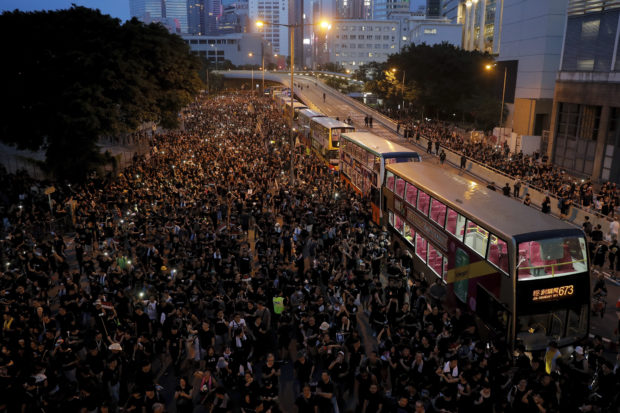Hong Kong opposition movement largely without leaders

Credit to Author: ggaviola| Date: Tue, 18 Jun 2019 02:53:27 +0000
HONG KONG – The largely youth-driven movement of black-clad protesters challenging Hong Kong’s government over an unpopular extradition bill is a coalition operating without a clear leadership structure.
And that adds to its appeal for supporters disaffected from the moneyed elites who run the former British colony, organizers say.
The nearly 2 million Hong Kong residents who marched all day Sunday in a massive show of opposition to the bill, which would allow extraditions to mainland China, largely acted on their own, said Bonnie Leung, a leader of the Civil Human Rights Front, one of dozens of groups coordinating the protests.
“It is civil society, from different walks of life, a lot of nameless people, a lot of different students’ unions, that are voluntarily and organically doing a lot of actions,” said Leung, whose group took responsibility for getting an official permit for Sunday’s march.
The collection of student groups, political and non-governmental organizations, labor unions and teachers’ associations that helped run the demonstration, and a string of earlier ones, ensured the march was orderly, even though thousands loitered afterward in a continued protest that was still underway 24 hours later.
“In this whole campaign, what we are trying to do is coordinate with different people,” Leung said in an interview.
“They are talking about, ‘Oh, will that work, what won’t work?’ There are no real leaders and this I believe is a very healthy development and this is very good for our campaign.”
For the many teens and 20-somethings who took to the streets, the protests are about far more than an extradition bill.
They are about preserving the autonomy Hong Kong was promised when Britain ceded its colony to mainland China in 1997, a “one-country, two-systems” arrangement that was supposed to assure Hong Kong separate legal and economic status for 50 years after the handover.
The marchers have drawn inspiration from earlier protests, especially the “Umbrella Movement” of 2014, when tens of thousands of mostly youthful demonstrators staged marches and sit-ins, snarling downtown traffic for weeks to demand a say in the election of Hong Kong’s leader — a demand that ultimately failed.
That Beijing-appointed leader, Chief Executive Carrie Lam, has insisted on forcing passage of the unpopular extradition bill — and is now the main target of the demonstrations. She backed down Saturday, indefinitely suspending the bill’s passage, but that did not appease the protesters.
The fluid, ad hoc nature of the movement was evident Monday, as hundreds of youths lingered near Lam’s office building.
A small but determined group vowed to continue demanding that Lam completely scrap the extradition bill, which if passed, could send some suspects in Hong Kong to China to face vague political charges, torture and unfair trials. That concern has grown with the increasingly authoritarian approach of today’s top Communist Party leader, President Xi Jinping.
Others believed they needed to retreat and draw up a timetable for their demands, said Nathan Law, a leader of Demosisto, a pro-democracy group advocating self-determination for Hong Kong.
“There is no long-term agenda, no leader. We all feel the same and want the same things, but we don’t have to follow any one person,” said one black-clad participant in his early 20s, who gave his name only as Jojo. /gsg